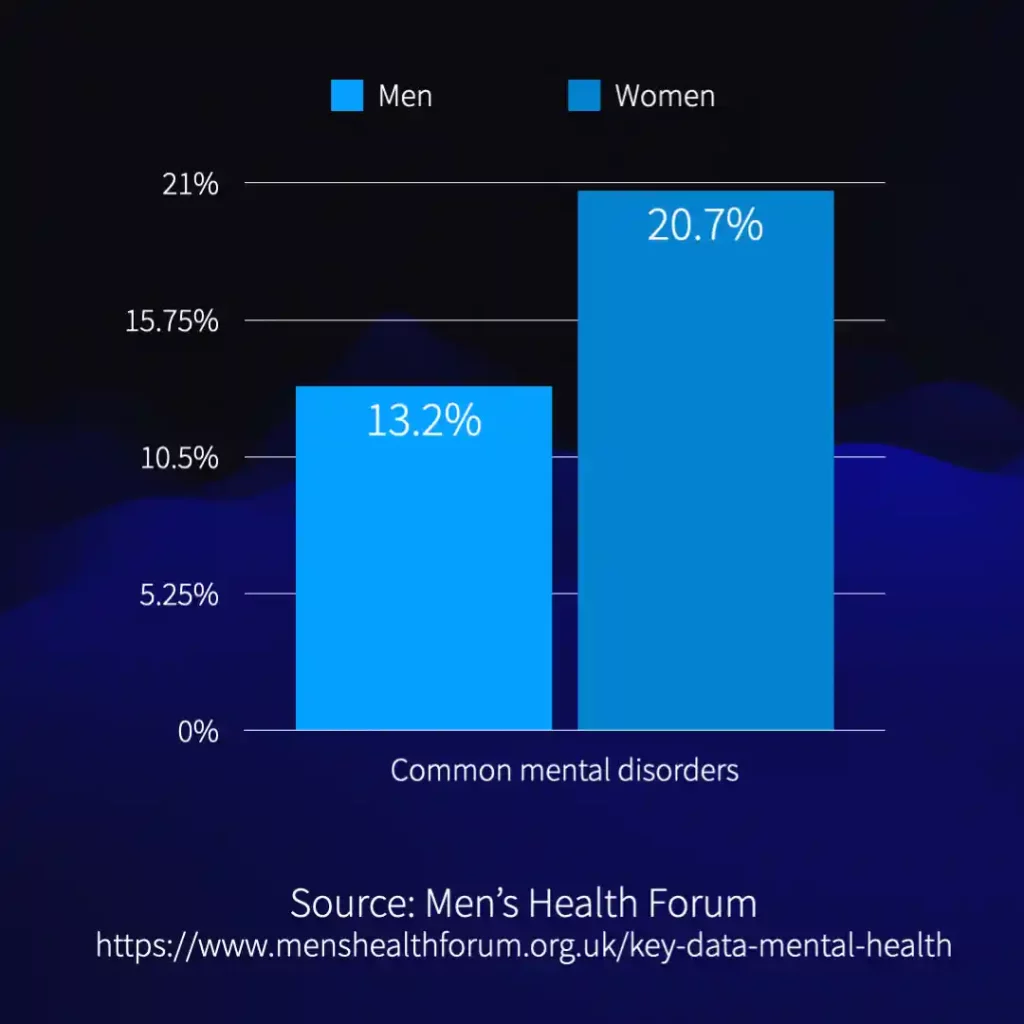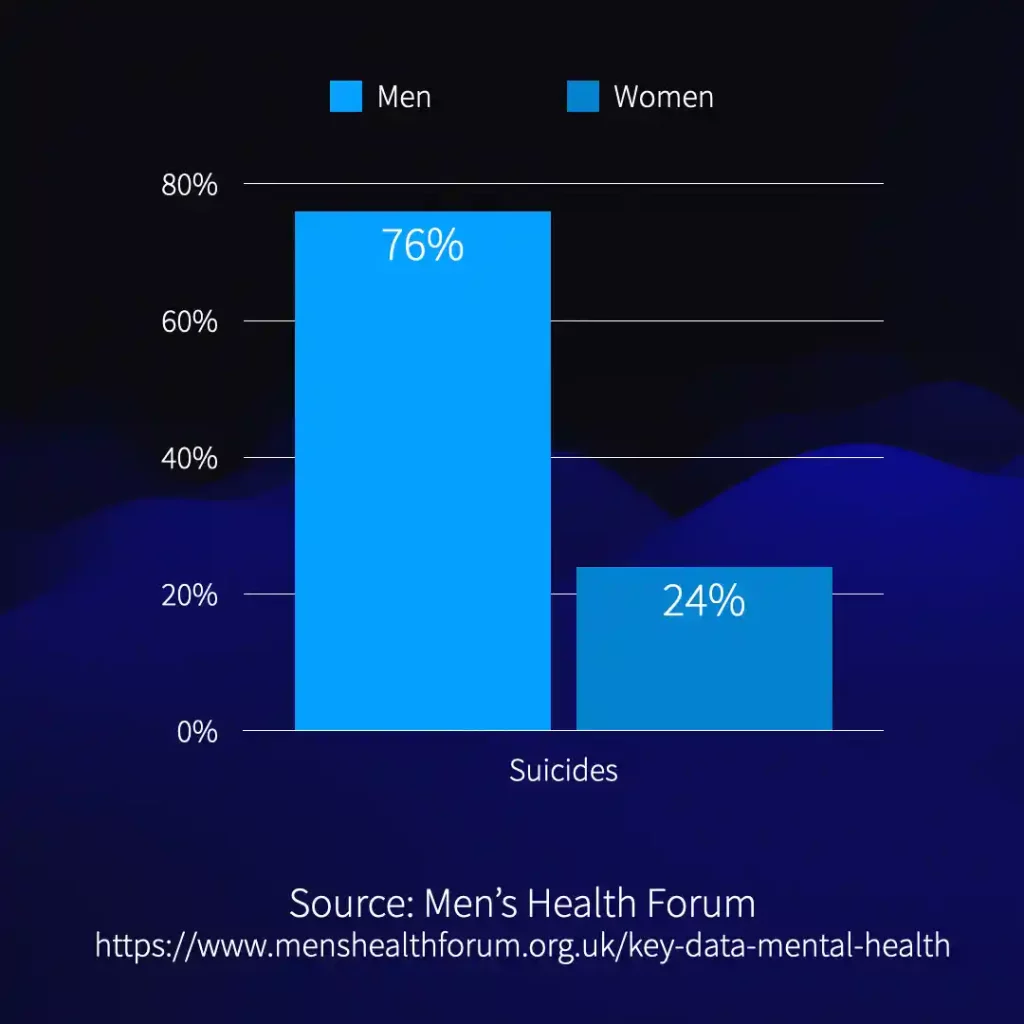So, it’s Men’s Mental Health Awareness Month again. Cheers to all you guys out there!
Men’s mental health matters. Awareness matters. Starting in the minds of every man.
How about you? Are you OK? Are you really OK?
1. The lethal shame
You know deep down if you are OK or not, of course. But this is a question you’re supposed to answer with a “Yes”. Isn’t it? Especially when you’re a man.
Even if it’s not true.

According to the Men’s Health Forum, 13% of the male population in the UK has a “common mental disorder” (for instance, depression or anxiety). The percentage for women is 21%. Is men’s mental health really better than women’s mental health?
I don’t think so.

According to the Men’s Health Forum again, 76% of suicides are committed by men.
I believe men suffer mentally just as much as women do, but we tend not to reach out for help. Because we’re ashamed.
And that shame kills too many of us! We keep things inside until we can’t take it anymore. Why?
2. The unfair stigma of mental illness
Most of us men are still brought up not to show such signs of this “weakness” because that’s how the majority still think of mental illness. It’s a weakness.
Strangely, a broken arm or a heart condition is more acceptable.
Let me tell you a story about strength, not weakness. I suffered from severe anxiety and long periods of depression for five decades. At the same time, I got an education, had a career, and I raised children. It was not a glorious life, but I kept going—most of the time.
If you ever struggled mentally, you’ll understand what an achievement this is. I felt weak and exhausted many times, but in hindsight, I must have been a pretty robust person to get through it.
Along the way, I knew people who didn’t make it. What can you do to avoid being one of them, one who waits for too long and become a part of the statistic mentioned above?
3. Admit to yourself: something isn’t right
You won’t get anywhere without admitting, at least to yourself, that things aren’t as they should be.
Look who’s talking! I wasted almost 40 years before I did this. The shame and fear of being “a nutcase” made me push on and on until it was almost too late.
Don’t waste precious years of your life like I did. We all deserve a better life than that.
If things don’t feel right, they aren’t. But remember, this is something you feel, not something you are. Understand that distinction. You have a problem, but the problem isn’t you. Just like a virus like COVID-19 can invade you and make you ill from the inside, but the virus is still not you.
This makes it feasible for you to make possibly the hardest but most important decision of your life:

4. Decide to face the problem
In November 2004, I had to make a decision myself. Should this be the end of everything, or should I start addressing the problem? The situation would be ridiculous if it hadn’t been so tragic. Imagine even considering death as an alternative to fighting for my health!
This shows how dangerous the shame is.
But let’s make some use of our upbringing as men here. Aren’t we supposed to be fighters? What’s the most masculine thing to do? Is it to pretend nothing’s wrong until it kills us? Or is it to face the problem and go into battle?
It’s not easy. I know. And it’s even harder on our own.
5. Talk to someone
Sharing your experiences always helps. Believe me. It’s like letting air out of a balloon about to burst.
But it might be tough to start talking. Let me tell you what happened when I did. In 2006, I told an old friend about my struggles. “I would keep that to myself if I were you,” he replied.
Don’t be scared off if something similar happens to you. If you know someone you trust, a partner, relative, or friend, they will also need time to adjust.
My friend didn’t intend to be dismissive. He grew up in the same shame-infused culture as I did and believed keeping things to myself was the best thing to do. He tried to protect me.
6. Try some awareness
These days, people talk and write about mindfulness to such an extent that the word almost has lost meaning. I’m not surprised if you feel a little nauseous when reading it. I do.
But being aware of what’s happening in your mind is essential to improve your situation. What are you thinking? What are you feeling? Find some quiet time and space, and look inside.
The most important thing is to observe your emotions. They are trying to tell you something important. The chatter of your thoughts is just your conscious mind trying to figure out what the emotions are saying. And the conscious brain often gets it wrong.
How can you know what the emotions want to tell you?

7. Dare to feel what you feel
Emotions aren’t verbal at all. They don’t say: “Sit down here, and I’ll explain why you’re sad”. The only way to understand them is to allow yourself to feel them and see what comes up.
And that’s pretty scary, especially if you’ve spent a lifetime pushing these emotions away.
This can also be confusing because emotions can be entangled in each other, hidden behind each other, and they will certainly not queue up in an orderly way. You’ll have to be patient.
And you’ll have to be careful. If you experienced severe traumas in your past, this isn’t work you should do on your own.
8. Seek professional help if necessary
Back In 2004, I decided I needed help and booked an appointment with my GP. Entering the doctor’s office that day was one of the hardest things I’ve ever done. The thought of having to explain my situation almost turned me back to the grim alternative.
This was irrational, of course. Health professionals today know emotional problems are real problems. This is one of the most common health issues they must handle. They probably have several patients with mental challenges every single day.
If you seek help, remember you are one of many. You’re not this year’s nutcase in their eyes. The GP or nurse won’t scorn you or ridicule you. If they feel anything slightly negative about your case at all, it’s because it’s so boringly commonplace.

9. What you need to know about medication
In most cases, the first thing a GP will do is to prescribe antidepressants. This is the cheapest and easiest thing to do.
This doesn’t necessarily mean it won’t help. Many depressions are temporary reactions to a difficult situation. If you find the right antidepressant, it may make your life a little easier until the depression eases off. Some antidepressants can also reduce anxiety for some people.
Finding an antidepressant that works for you and one where the benefits are higher than the side effects might require trial and error. Patience, mate.
But you’ll have to keep in mind that antidepressants are like mental painkillers. They might help people cope with the situation but never fix the underlying problem. If you suffer from long-term anxiety or depression, a real solution must be sought elsewhere.
10. The danger of self-medication
And that “elsewhere” is definitely not self-medication with alcohol or drugs.
Yes, I’ve spent enough time at the end of a bottle myself to admit we sometimes need a short break from the suffering. But the fact is, everything that’s capable of giving you instant relief from mental pain is highly addictive – physically or mentally.
When I say everything, I mean everything. Alcohol, illegal drugs, and prescribed drugs like Valium.
Never think of these “painkillers” as friends of yours because they will stab you in the back soon enough. Keep an eye on them.
If you notice you must visit your “friends” with increasing frequency, you have every good reason to look for real solutions. You don’t want to end up with addictions on top of your original problems.

11. Coping with therapy
In 2006, after I had tried all the various families of antidepressants available and never achieved any effects at all but side effects, my GP recommended therapy.
I was nervous before my initial appointment with the GP, but I nearly hyperventilated before the first therapy session. As you should understand by now, my fear and shame were even more irrational this time.
Think about it for a moment. What was the worst thing that could happen to me in the therapist’s office? What’s the worst thing that could happen to you?
Oh, I see. You could end up crying(!) in front of a stranger. How unmanly!
No, mate. That’s probably the best thing that could happen to you. You would get much-needed relief from the emotional pressure inside you in front of a person bound by professional confidentiality, trained to be supportive and nonjudgemental and help you understand what’s happening.
No doubt, the trickiest thing for us men is allowing ourselves to be vulnerable enough in therapy. I squandered most of my time there myself. What I did was to analyse my past and why I had ended up in all that misery. And most of my conclusions were absolutely right. But what I should have done was to focus on the emotions, not the analytics.
To untangle difficult emotions, you must accept they’re there and feel how they feel. They won’t go away unless you do. Most likely, you suffer now because you just pushed the emotions away back then, perhaps long ago, when you should have listened to them.
As with medication, you might have to look for the right therapists. Some of them have personalities that suit you better than others. The same is true for the theoretical framework and therapeutical methods they use.
12. Finding support elsewhere
I highly recommend professional help if you have experienced severe trauma.
But the fact is, most people who struggle a little less don’t necessarily need someone with a university degree to talk to. They just need someone to talk to.
If you don’t have a partner, relative, or friend who can listen and support you without being judgemental, there might be other options. You can consider peer support groups if they are available in your area. Perhaps this sounds terrifying, but speaking to people with similar challenges is often easier. They actually know how it feels.
There are also forums on the Internet that are comparable to peer support groups. You can even be anonymous if that makes it easier for you. But be aware. People who can hide behind anonymity will often take on a different persona than in real life. Not all of them have your best interest in mind.
And even worse, you might notice your online personality isn’t really you either. In that case, this isn’t what you need. You need to be real for this to work and not play a part.

13. Avoid being re-traumatised
The main reason why I recommend professional help if you have experienced severe trauma is this: trained experts can help you avoid being exposed to your trauma too quickly or in the wrong way. You need a professional navigator because recovering from trauma can be dire straits indeed.
I speak from experience. In 2019, I decided I was ready for the final battle—my D-day. For the previous 15 years, I had periodically been on medication and in therapy, and I had read tons of self-help books and psychology textbooks. I had been through ups and downs, but I had gradually got better.
So, I decided I knew enough and was strong enough. I plunged headlong into it all. I actively searched for every bad memory and difficult emotion I could find. I wanted to remember everything, feel everything, and be done with it.
It nearly broke me.
I survived, and I benefited greatly from what I did. But I wouldn’t recommend this approach to anyone. It could just as well have gone wrong.
14. It might take some time
There are no quick and easy solutions for complicated problems. Most people who advertise quick fixes are trying to sell you something that most likely won’t work at all.
Give yourself the necessary time. It’s worth it. I promise.
Please don’t be put off by my story. I waited 40 years before I started my journey and needed 15 years to complete it. But you don’t have to make all the mistakes I made. That’s why I’m sharing all of this.

15. Don’t give up
There’s only one way you can be sure to fail: to give up and not try at all.
If you give up, you are betraying your future self. You might say you can’t see a future. That may be true. But the fact that you can’t see it right now doesn’t mean it isn’t available.
I have a life now I couldn’t have dreamed of 5, 10 or 40 years ago. This life wouldn’t have existed if my past self had decided to do nothing. Or even worse, to end it.
Change is possible. There is always hope as long as you’re breathing.
16. Start moving. Be a hero!
It’s up to you to take the first step. The first step is always the most difficult, but that’s how every journey starts.
If you need some advice on how to start changing your life in a gentle, realistic way, you are welcome to read the first part of my “A life worth living” series.
Remember, most people who suffer emotionally do so because something happened to them or was done to them. To cover it all up inside you isn’t bravery if that’s what you’re still thinking. This is being a snail hiding inside your shell.
Courage is to stand up and face your problems. Say it. “I deserve a life worth living, and I’m bloody going to get it. Get out of my way!”
Try it! Be courageous. Be a real man. Be a hero!
If you are in a crisis and need someone to talk to right now, there are many emergency helplines out there. Don’t hesitate!
If you live in the UK, you can find a list of helplines on this mind.org.uk page:



+ There are no comments
Add yours